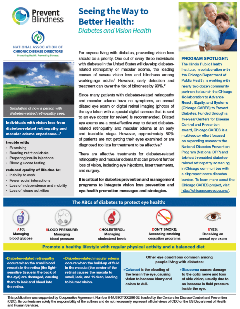Seeing the Way to Better Health: Integrating Vision and Eye Health into Diabetes Programs
Nov 9, 2020, 10:03 AM
By Nita Sinha, OD, MPH, Director of Public Health, Prevent Blindness
 I did not realize until I went to optometry school that diabetes had such an effect on the vision and eye health of someone living with diabetes. Learning this information hit close to home as my father had been living with diabetes for many years. Since then, I understand the importance of ensuring those living with diabetes are educated, aware and proactive in seeking eye care. As a public health professional, I know that eye care providers cannot do it alone- it takes education and outreach from all those helping individuals living with diabetes to understand the importance of healthy vision.
I did not realize until I went to optometry school that diabetes had such an effect on the vision and eye health of someone living with diabetes. Learning this information hit close to home as my father had been living with diabetes for many years. Since then, I understand the importance of ensuring those living with diabetes are educated, aware and proactive in seeking eye care. As a public health professional, I know that eye care providers cannot do it alone- it takes education and outreach from all those helping individuals living with diabetes to understand the importance of healthy vision.
For anyone living with diabetes, preventing vision loss should be a priority. One out of every three individuals with diabetes in the United States will develop diabetes-related retinopathy or macular edema, the leading causes of severe vision loss and blindness among working-age adults.1 Early detection of these conditions through an eye examination and treatment can lower the risk of blindness by 90%.2 However, approximately 50% of people living with diabetes are not getting their eyes examined or are diagnosed too late for treatment to be effective.2 People with vision loss from diabetes-related retinopathy and macular edema experience trouble with exercising, reading nutrition labels, preparing insulin injections and blood glucose testing.3 There are effective treatments for diabetes-related retinopathy and macular edema that can prevent further loss of vision, including eye injections, laser treatments and surgery.
It is critical for individuals living with diabetes to learn about the importance of eye health from their diabetes prevention and management programs. Programs can integrate eye health promotion messages and strategies in the following ways:
- Diabetes health campaigns: Integrate messaging about vision and eye health into programs that promote diabetes health to diverse populations, including populations at high risk and communities of color.
- Healthy aging programs: Integrate vision screening and early detection activities, improve access to and use of eye care services and incorporate eye health awareness messages into programs that promote healthy vision and active aging.
- Caregiver support programs: Support caregivers by providing them with vision and eye health resources specifically for individuals with diabetes. These resources should include measures to prevent vision loss by receiving recommended eye care services. They should also include contact information for low vision rehabilitation programs to assist those with uncorrectable vision impairment.
- Professional development activities: Include information about the benefits of early detection and treatment for diabetes-related eye disease in training programs for professionals who promote diabetes health.
Integrating vision and eye health strategies into other programs and activities can improve quality of life for individuals with diabetes. The Seeing the Way to Better Health: Diabetes and Vision Health issue brief and infographics were created by Prevent Blindness and the National Association of Chronic Disease Directors to support state, local and community programs with the integration of vision and eye health strategies. Use these resources to understand your role in the management of vision and diabetes, as well as access a variety of program tools and graphics for use in your program communications.
References:
- Zhang X, Saaddine JB, Chou CF, et al. Prevalence of diabetic retinopathy in the United States, 2005-2008. JAMA. 2010;304(6): 649–656. doi:10.1001/jama.2010.1111
- Centers for Disease Control and Prevention (2018). CDC Features: Keep an Eye on Your Vision Health. https://www.cdc.gov/features/healthyvision/index.html. Accessed July 21, 2020
- Coyne KS, Margolis MK, Kennedy-Martin T, Baker TM, Klein R, Paul MD, Revicki DA. The impact of diabetic retinopathy: Perspectives from patient focus groups. Family Practice. 2004;21(4): 447–453. https://doi.org/10.1093/fampra/cmh417
ADCES Perspectives on Diabetes Care
The Association of Diabetes Care & Education Specialists Perspectives on Diabetes Care covers diabetes, prediabetes and other cardiometabolic conditions. Not all views expressed reflect the official position of the Association of Diabetes Care & Education Specialists.
Copyright is owned or held by the Association of Diabetes Care & Education Specialists and all rights are reserved. Permission is granted, at no cost and without need for further request, to link to, quote, excerpt or reprint from these stories in any medium as long as no text is altered, and proper attribution is made to the Association of Diabetes Care & Education Specialists.
HEALTHCARE DISCLAIMER: This site and its services do not constitute the practice of medical advice, diagnosis or treatment. Always talk to your diabetes care and education specialist or healthcare provider for diagnosis and treatment, including your specific medical needs. If you have or suspect that you have a medical problem or condition, please contact a qualified health care professional immediately. To find a diabetes care and education specialist near you, visit DiabetesEducator.org/Find.